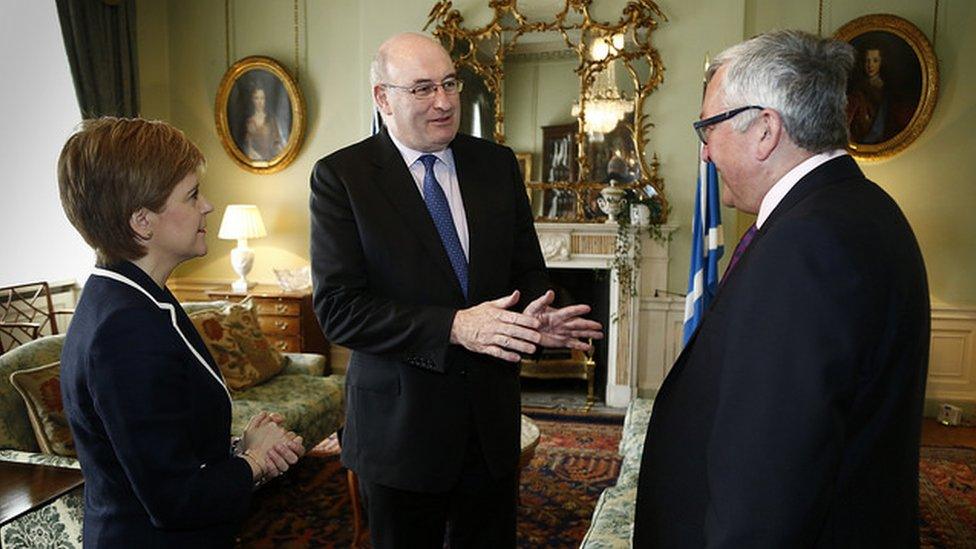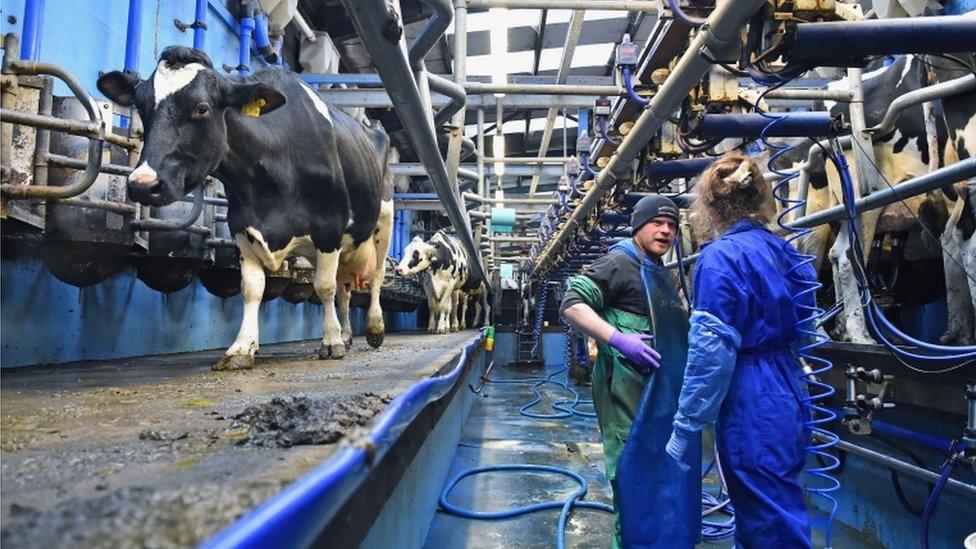EU official meets Nicola Sturgeon over farm payments
- Published

The Scottish government said the meeting between Mr Hogan (centre), Ms Sturgeon and Mr Ewing had been "very positive"
A senior European official has met Scotland's first minister to discuss delays to EU farming subsidy payments.
Phil Hogan, the EU's agriculture commissioner, said he wanted to help Scotland get the money to farmers as quickly as possible.
Only about 80% of Scottish farmers have so far received their Common Agricultural Policy (CAP) payments.
The Audit Scotland watchdog has said problems with a new Scottish government IT system were largely to blame.
Mr Hogan discussed the issues with First Minister Nicola Sturgeon and her new rural economy secretary, Fergus Ewing, at Bute House in Edinburgh.
A spokeswoman for the Scottish government said: "It was a good discussion and the first minister and Mr Ewing found the meeting with the commissioner to be very positive."
The EU hands responsibility for paying out the money to national and regional governments, including Scotland - which is due to receive about £5.8bn in CAP Futures funding over the next six years.
Best value
The money is mainly given to improve agricultural productivity and to ensure farmers have a reliable source of income.
Farming union NFU Scotland has called on the Scottish government to "get to grips" with its "calamitous" attempts to distribute the money, with about a fifth of farmers still not having received anything.
The Scottish government has said it is keeping a tight rein on activity, costs and risks, to secure the best value it can for the taxpayer.
The government faces fines of between £40m and £125m if farmers are not paid by the 30 June deadline.

About a fifth of Scotland farmers have not yet received any CAP Futures money from the Scottish government
Speaking ahead of the meeting with Ms Sturgeon, Mr Hogan told the BBC's Good Morning Scotland programme: "Nobody wants to see uncertainty or instability at the moment in terms of farm income because markets are in a difficult situation at the moment, particularly in the dairy sector.
"We want to get money as quickly as we possibly can to farmers and we want to help Scotland to do so."
Check system
NFU Scotland has criticised the complexity of the CAP system, and the "fear" that has built up over penalties incurred by accidental breaches of the rules.
Mr Hogan said he had attempted to simplify the "complexity and bureaucracy" of the CAP since becoming commissioner, and highlighted two initiatives in particular which he said would make it easier for farmers to get the money due to them.
These included a preventive preliminary check system, which sees officials look at initial applications and correct any minor mistakes to help farmers comply with the regulations.
And Mr Hogan also highlighted a "yellow card system" to reduce the penalties incurred for any unintentional errors, particularly for smaller farmers.
Mr Hogan addressed farmers at Ingliston on Thursday evening during an NFU Scotland debate on the EU referendum, where he backed the UK remaining in the EU, with former UK rural affairs secretary Owen Paterson putting forward the case for Brexit.
'Enormously beneficial'
Speaking on the BBC's Today programme on Friday morning, Mr Hogan insisted that the EU's common agricultural policy was "enormously beneficial to UK agriculture and food" and generated an enormous amount of employment.
He said: "If you're not in the single market - like what's advocated by the Leave Campaign - you would certainly have to renegotiate arrangements with the existing 27 Member States, and the 53 free trade agreements around the world that we have".
But the Vote Leave campaign's agriculture spokesman, Huw Bell, told Good Morning Scotland that Prime Minister David Cameron had already said that support payments to farmers would continue even if the UK left the EU.
He added: "If we look at countries in Europe that aren't in the EU, like Norway and Switzerland, they actually pay higher payments to their farmers.
"We would be able to actually save a lot of money. Britain in 2014 contributed £4.5bn to the Common Agricultural Policy, but we only got £2.9bn back."